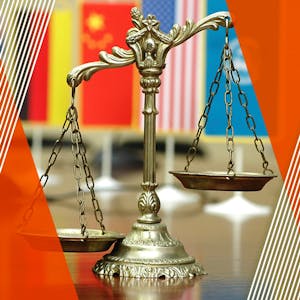Embark on a journey to comprehend the complexities of international law with the "Introducción al Derecho Internacional Público" course. This course offers an in-depth exploration of the impact of globalization on international relations, covering topics such as the distinction between public and private international law, the relationship between international and domestic law, sources of international law, and the creation of treaties. Gain insight into the subjects of international law, the processes involved in diplomatic negotiations, and the privileges and immunities granted to treaty negotiators. Understand the structure and functions of international organizations and their implications for global business.
Delve into the nuances of diplomacy, including the roles of heads of state, diplomats, and consular agents, as well as the protocols and privileges associated with diplomatic functions. Explore the legal personality of international organizations, their organs, and the manifestation of their will, along with the means of action available to them. Gain a comprehensive understanding of economic cooperation and integration, including different forms of economic integration and the role of organizations such as the World Trade Organization (WTO) in resolving disputes. This course equips learners with the knowledge and skills necessary to navigate the complexities of international law and contribute to upholding the principles of global legal frameworks.
Certificate Available ✔
Get Started / More Info
Embark on a comprehensive exploration of international law, treaties, diplomacy, and economic integration in six meticulously designed modules, each offering an in-depth understanding of key aspects of "Introducción al Derecho Internacional Público."
Module 1 serves as the foundation for the course, providing an overview of the emergence and evolution of public international law, the distinction between public and private international law, the relationship between international and domestic law, and the sources of international law. Learners will also explore the process of treaty creation, the subjects of international law, and the structure of international organizations.
Module 2 delves into the intricacies of diplomacy, covering the roles of heads of state, diplomats, and consular agents, as well as the functions, privileges, and immunities associated with diplomatic activities. Learners will gain a deep understanding of diplomatic protocols and the art of successful negotiations.
Module 3 explores the legal personality of international organizations, their organs, and the manifestation of their will, along with the means of action available to them. Learners will gain insights into the structure and functioning of prominent international organizations, including the United Nations (UN).
Module 4 focuses on economic cooperation and integration, covering various forms of economic integration and the role of organizations such as the World Trade Organization (WTO). Learners will also delve into the mechanisms for resolving trade disputes and promoting fair and equitable global trade.
Module 5 equips learners with a comprehensive understanding of the complexities of global economic integration, including the forms and mechanisms of integration, as well as the role of the World Trade Organization (WTO) in maintaining a fair and equitable global trade environment.
Module 6 marks the culmination of the course, offering a comprehensive review and consolidation of the knowledge and insights gained throughout the modules, ensuring learners are equipped to navigate the complexities of international law and contribute to the preservation of global legal frameworks.
Contracts I & II provides a comprehensive overview of contract law in the United States, covering key concepts and common-law cases. Learners will understand...
Cross-border road transport in EU law context provides a comprehensive understanding of the legal framework and its practical application in the international road...
Human Rights for Open Societies is an in-depth exploration of the European Convention on Human Rights and its role in protecting fundamental freedoms in open societies....
This course provides an in-depth exploration of intellectual property, covering patents, trademarks, and copyrights, and their impact on business and innovation....